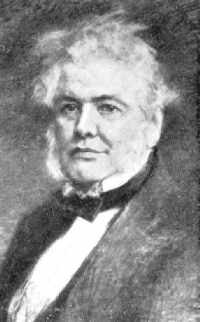ISAAC BUTT, FOUNDER OF THE HOME RULE MOVEMENT
 Isaac Butt, regarded as the founder of the Home Rule Movement in Ireland, was born in Glenfin, on the 6th of September, 1813, the only son of a Protestant rector. He was educated at the Royal School, Raphoe and at Trinity College, Dublin. A brilliant scholar, he was one of the founders of the influential Dublin University Magazine (1833) and editor (1834-38). Professor of Political Economy (1836-41), he was called to the bar 1838 and soon became a leader in his profession. A member of both the Irish and the English bar, he was a noted conservative lawyer and an opponent of Daniel O’Connell.
Isaac Butt, regarded as the founder of the Home Rule Movement in Ireland, was born in Glenfin, on the 6th of September, 1813, the only son of a Protestant rector. He was educated at the Royal School, Raphoe and at Trinity College, Dublin. A brilliant scholar, he was one of the founders of the influential Dublin University Magazine (1833) and editor (1834-38). Professor of Political Economy (1836-41), he was called to the bar 1838 and soon became a leader in his profession. A member of both the Irish and the English bar, he was a noted conservative lawyer and an opponent of Daniel O’Connell.
In these early years he wrote for the conservative press on both sides of the Irish Sea, and established a weekly newspaper in Dublin, the Protestant Guardian. After the Great Famine of the 1840s, he became increasingly liberal. The idealism of the Young Irelanders won him over to nationalism, and in 1848 he defended many Fenians, sacrificing lucrative briefs to do so although his financial position was precarious, as it remained throughout his life.
In 1852 Butt was elected to Westminster as Tory MP for both Harwich and Youghal in County Cork, a seat he held until 1865. After the 1867 Rising, Butt defended Fenian prisoners as a result of which he became an advocate of Home Rule and legislative independence for Ireland. In 1869 Butt founded the Amnesty Association for the release of Fenian prisoners and in 1870 he founded the Home Rule Association. In 1871 Butt stood for election on a Home Rule ticket and was returned as MP for Limerick. In 1875 he publishedLand Tenure in Ireland. Issac Butt was MP for Limerick until his death near Dundrum, Co. Dublin on 5th May, 1879.
Three years earlier, on the 26th December, 1876, he wrote to a friend, Dr O’Leary MP;
‘If I die in England, I think it better I should be buried in Brompton Cemetary in the grave with my mother and child.’
However, in the next paragraph, he states;
‘If…the expence would not be an inconvenience, I would wish to be buried in Stranorlar Graveyard, as close as may be to the South-Eastern angle. The ground is – or was – a good deal lower than the rest of the churchyard. A very shallow grave would be enough, with a mound of earth or a tomb raised over it. Put no inscription over the grave, except the date of my birth and my death; and, wherever I am buried, let the funeral be perfectly private, with as few persons attending, and as little show and expense as possible.’
Butt handed this letter to Dr O’Leary on the day it was written, and on the envelope was written ‘To be religiously observed’.
The following October (1877), Dr O’Leary met Butt at Bangor. Butt was in poor spirits and was returning to Ireland from Buxton in Derbyshire, a spa, whose mineral waters were taken for rheumatic diseases and other complaints. He was depressed, and believed he was going to die soon. He asked if his letter, written the previous Christmas, was safe, and Dr O’Leary assured him it was, but stated that a third person should be made aware of his wishes. Butt sat down immediately and wrote a copy of the letter from memory, which he sent to his daughter.
Both letters were produced the day after he died, and so the funeral was to be private and in Stranorlar. The train carrying his coffin, together with family members, left Amiens Street Station (Dublin) on Saturday morning at 9:00am, arriving at Strabane Station that afternoon. The coffin – of polished oak, with heavy brass mountings – bore the simple inscription:
‘Isaac Butt – Died 5th May 1879 – Aged 65 years’
The coffin of the man knowing no religious bigotry, was carried from the church by a number of working men, who no doubt considered it an honour, and borne to the South-East angle of the churchyard. Nearly all present remained until the grave was filled in, and the ‘last green sod placed on the grave of him whose memory a nation honours’.
